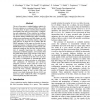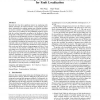388 search results - page 71 / 78 » Learning to Optimize Plan Execution in Information Agents |
GECCO
2008
Springer
13 years 8 months ago
2008
Springer
While John Holland has always envisioned learning classifier systems (LCSs) as cognitive systems, most work on LCSs has focused on classification, datamining, and function appro...
CHI
2010
ACM
13 years 7 months ago
2010
ACM
Researchers have detailed the importance of routines in how people live and work, while also cautioning system designers about the importance of people's idiosyncratic behavi...
VLDB
2004
ACM
14 years 24 days ago
2004
ACM
The use of inaccurate or outdated database statistics by the query optimizer in a relational DBMS often results in a poor choice of query execution plans and hence unacceptably lo...
PASTE
2010
ACM
14 years 16 days ago
2010
ACM
Recently there has been significant interest in employing probabilistic techniques for fault localization. Using dynamic dependence information for multiple passing runs, learnin...
SIGECOM
2004
ACM
14 years 27 days ago
2004
ACM
The revelation principle is a cornerstone tool in mechanism design. It states that one can restrict attention, without loss in the designer’s objective, to mechanisms in which A...


